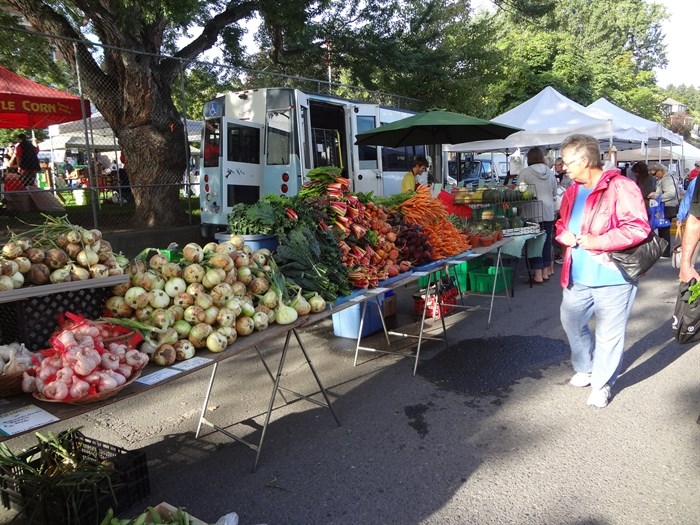
The downtown Kamloops Farmers' Market.
Image Credit: Shirley Culver
February 02, 2016 - 1:27 PM
KELOWNA - A UBC Okanagan professor says Canadian food prices are spiking right now but will likely drop as the seasons change.
Dr. John Janmaat, an associate professor of economics at UBCO, who specializes in natural resources, says several factors contribute to the high prices, particularly the low Canadian dollar compared the the U.S. dollar.
“We have a currency issue. Another driver is that there’s a huge demand,” Janmaat says. “Add to that that there’s a drought in California which is a food producer.”
While high costs are tough for consumers to swallow, they’re good for local producers. With higher prices, local producers will be encouraged to produce more, Janmaat says.
“It gives Canadian producers an opportunity to make money that wasn’t there before,” he says. “When our production goes up, supply goes up and we’ll see our prices come down.”
There is land in the Okanagan that is sitting idle, Janmaat says. With weather contributing to high prices now, he expects the upcoming growing season to affect prices.
“Later on in the summer our production could offset prices,” Janmaat says. “Because of our season we’re not likely to grow some of this in green houses.”
Longer term, the prognosis is better specifically if the drought in California isn't as as bad as last year. The period between fall 2011 and 2014 was the driest since records were kept, according to the Public Policy Institute of California. This led to aquifers being used and a water shortage during the 2015 growing season.
Janmaat says he’s seen predictions of more rainfall for the upcoming season due to El Nino, a weather pattern that brings warmer weather to North America’s west and often precipitation to California.
Even if rain doesn’t arrive in California, it doesn’t necessarily mean even higher prices, though.
“If there’s another drought that might encourage other areas to produce food,” Janmaat says. “Because they couldn’t compete with California before.”
Janmaat says consumers can still help themselves. Gardening at home is a start.
“I’m still going through things I grew last summer, things that keep like onions and squash,” he says.
Janmaat also says consumers should be skeptical of health food trends, like the sudden interest in cauliflower.
“If you’re willing to shop around a bit and learn more about a balanced diet you can probably bring your costs down,” he says. “The next super food will be around in a couple years.”
One place he highlights is Kelowna’s B.C. Tree Fruit store, which often has lower prices and local produce.
To contact a reporter for this story, email Brendan Kergin at bkergin@infonews.ca or call 250-819-6089. To contact an editor, email mjones@infonews.ca or call 250-718-2724.
News from © iNFOnews, 2016